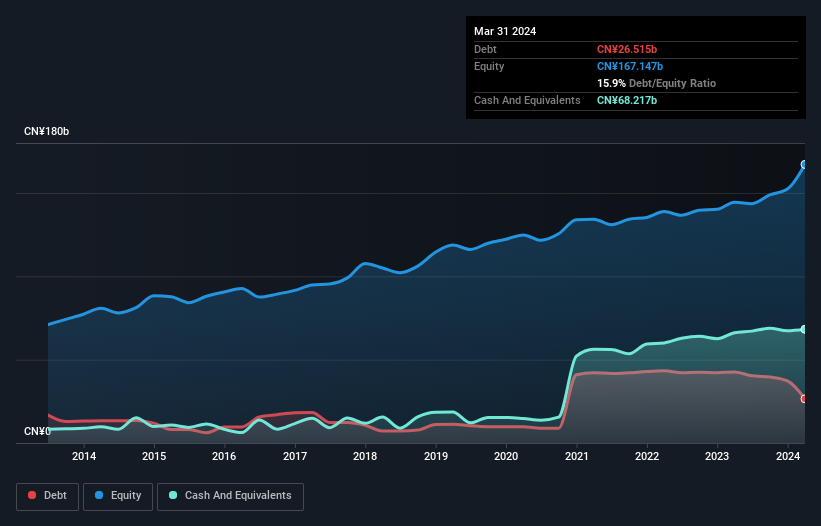
Legendary fund manager Li Lu (who Charlie Munger backed) once said, 'The biggest investment risk is not the volatility of prices, but whether you will suffer a permanent loss of capital.' It's only natural to consider a company's balance sheet when you examine how risky it is, since debt is often involved when a business collapses. We note that Daqin Railway Co., Ltd. (SHSE:601006) does have debt on its balance sheet. But the real question is whether this debt is making the company risky.
When Is Debt Dangerous?
Debt and other liabilities become risky for a business when it cannot easily fulfill those obligations, either with free cash flow or by raising capital at an attractive price. In the worst case scenario, a company can go bankrupt if it cannot pay its creditors. However, a more frequent (but still costly) occurrence is where a company must issue shares at bargain-basement prices, permanently diluting shareholders, just to shore up its balance sheet. Of course, plenty of companies use debt to fund growth, without any negative consequences. When we think about a company's use of debt, we first look at cash and debt together.
Check out our latest analysis for Daqin Railway
How Much Debt Does Daqin Railway Carry?
You can click the graphic below for the historical numbers, but it shows that Daqin Railway had CN¥26.5b of debt in March 2024, down from CN¥42.6b, one year before. But on the other hand it also has CN¥68.2b in cash, leading to a CN¥41.7b net cash position.

How Strong Is Daqin Railway's Balance Sheet?
According to the last reported balance sheet, Daqin Railway had liabilities of CN¥14.5b due within 12 months, and liabilities of CN¥29.0b due beyond 12 months. Offsetting this, it had CN¥68.2b in cash and CN¥12.0b in receivables that were due within 12 months. So it can boast CN¥36.7b more liquid assets than total liabilities.
This surplus suggests that Daqin Railway is using debt in a way that is appears to be both safe and conservative. Due to its strong net asset position, it is not likely to face issues with its lenders. Succinctly put, Daqin Railway boasts net cash, so it's fair to say it does not have a heavy debt load!
But the other side of the story is that Daqin Railway saw its EBIT decline by 5.8% over the last year. That sort of decline, if sustained, will obviously make debt harder to handle. The balance sheet is clearly the area to focus on when you are analysing debt. But ultimately the future profitability of the business will decide if Daqin Railway can strengthen its balance sheet over time. So if you're focused on the future you can check out this free report showing analyst profit forecasts.
Finally, while the tax-man may adore accounting profits, lenders only accept cold hard cash. Daqin Railway may have net cash on the balance sheet, but it is still interesting to look at how well the business converts its earnings before interest and tax (EBIT) to free cash flow, because that will influence both its need for, and its capacity to manage debt. Over the most recent three years, Daqin Railway recorded free cash flow worth 70% of its EBIT, which is around normal, given free cash flow excludes interest and tax. This free cash flow puts the company in a good position to pay down debt, when appropriate.
Summing Up
While it is always sensible to investigate a company's debt, in this case Daqin Railway has CN¥41.7b in net cash and a decent-looking balance sheet. The cherry on top was that in converted 70% of that EBIT to free cash flow, bringing in CN¥7.2b. So is Daqin Railway's debt a risk? It doesn't seem so to us. When analysing debt levels, the balance sheet is the obvious place to start. However, not all investment risk resides within the balance sheet - far from it. For example, we've discovered 2 warning signs for Daqin Railway that you should be aware of before investing here.
Of course, if you're the type of investor who prefers buying stocks without the burden of debt, then don't hesitate to discover our exclusive list of net cash growth stocks, today.
New: Manage All Your Stock Portfolios in One Place
We've created the ultimate portfolio companion for stock investors, and it's free.
• Connect an unlimited number of Portfolios and see your total in one currency
• Be alerted to new Warning Signs or Risks via email or mobile
• Track the Fair Value of your stocks
Have feedback on this article? Concerned about the content? Get in touch with us directly. Alternatively, email editorial-team (at) simplywallst.com.
This article by Simply Wall St is general in nature. We provide commentary based on historical data and analyst forecasts only using an unbiased methodology and our articles are not intended to be financial advice. It does not constitute a recommendation to buy or sell any stock, and does not take account of your objectives, or your financial situation. We aim to bring you long-term focused analysis driven by fundamental data. Note that our analysis may not factor in the latest price-sensitive company announcements or qualitative material. Simply Wall St has no position in any stocks mentioned.
Have feedback on this article? Concerned about the content? Get in touch with us directly. Alternatively, email editorial-team@simplywallst.com
About SHSE:601006
Daqin Railway
Provides railway transportation services in the People’s Republic of China and internationally.
Excellent balance sheet and slightly overvalued.
Market Insights
Community Narratives



